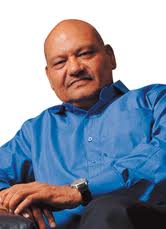|


New Delhi, Aug 24 (IANS) On the web site of London-based industrialist Anil Agarwal's minerals-to-mining group, there is a telling slogan: "Sustainable development is key part of Vedanta's strategy and overall ethos."
Ironically, it is over environmental concerns that India Tuesday formally rejected its bauxite-mining project in Orissa, after securing an experts committee's view and legal opinion, despite intense lobbying over the past few days.
The proposed takeover of Cairn Energy's India business could see the NRI billionaire emerging as the richest promoter of a corporate house ahead of Mukesh Ambani, reported Times of India recently.
What is this $7.92 billion group all about that seems to unfailingly attract adverse opinion, be it for mining rights for minerals, setting up a new processing units, or for acquisitions made in India's corporate world?
The group's holding arm is Vedanta Resources, with five main companies in its fold, all with controlling stake -- Sterlite Industries (Maharashtra), Vedanta Aluminium (Orissa), Madras Aluminium (Tamil Nadu), Sesa Goa (Goa) and Konkola Copper Mines (Zambia).
Among them, Sterlite in turn has four companies in its fold -- former state-run Bharat Aluminium (Chhattisgarh) and Hindustan Zinc (Rajasthan), Sterlite Energy (Maharashtra) and Copper Mines of Tasmania (Australia).
The group -- which today has 30,000 people on its rolls -- saw its real journey begin in 1976, when Agarwal gave a proper corporate shape and structure to a small family-owned scrap metals business and decided to concentrate on mining and minerals industries.
"India is a fast-emerging and attractive resource destination," said 56-year-old Agarwal while reflecting on what has been his corporate philosophy, or "vedanta", all along his 30-year journey in the country's and global corporate world.
"We believe our strategy and business objectives will harness India's high-quality wealth of mineral resources at low costs of development, positioning it as a leader on the global metals and mining map," Agarwal, ranked 113th on Forbes rich list, added.
He named his company Sterlite Industries in 1986 and two years later went for an initial public offer in India. He made some forays into other areas, such as making optic fibre cables, but the core area remained the metals business.
Then followed a spate of acquisitions both in India and overseas -- and with it came the controversies, since many of them, such as Bharat Aluminium and Hindustan Zinc, involved public sector undertakings over which there was much resistance, mainly political.
The Church of England even sold its holding in his London-listed Vedanta Resources, saying it was not particularly satisfied with the company's respect for human rights, specifically, the treatment of tribes people in eastern India.
The latest in this area of buy-outs, and controversy, was the announcement last week of a deal to acquire up to 60 percent of British energy giant Cairn's Indian arm -- which is into oil and gas exploration -- for around a whopping $9.5 billion.
Despite this hullabaloo, the company also had several distinctions. Notably, in 2003, it became the first Indian company to list on the London Stock Exchange and also floated several eyebrow-raising bonds issues -- like the one in 2008 to raise $1.25 billion.
In fact, in every business the group operates in India it is either the largest or enjoys the second place. Globally, its copper smelter is among top 10 in the world and Hindustan Zinc is the fifth largest producer of the commodity.
But all this has not stopped criticisms, neither at home nor in the countries in which he operates -- not even his pledge to give away as much as 75 percent of his personal wealth, estimated at around $6.4 billion, in charity.
Click
here to send Gifts to India
|

